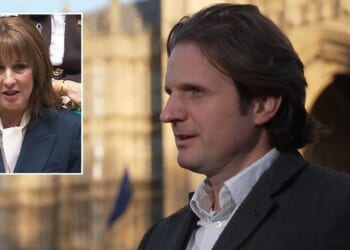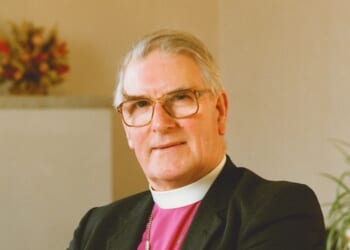
Journalist Ben Appel is on a remarkable journey, one that has taken him from being a disciple to a doubter to a full-blown heretic, but not in the way you might think.
You see, he is a “heretic” today not because he no longer ascribes to the quasi-Christian doctrines he was taught in his childhood, but because he dares to dissent from the tenets of what he calls the “Church of Social Justice.”
But first, let me pause and rewind a bit, as an interesting history is at work.
In 2021, a conservative Christian friend sent me Appel’s fascinating long-form essay in Quillette, and to date, it is one of the most memorable articles I have ever read. That essay from a truly gifted writer has now taken shape more fully in an upcoming memoir to be released next month (I was honored to read a preview copy).
The memoir is called Cis White Gay: The Making of Gender Heretic, and in case anyone’s wondering why a review of a book like this by a man who writes that his same-sex attraction “made [him] feel whole” and who campaigned for the legalization of same-sex marriage (and is in one) is appearing in a theologically orthodox Evangelical publication which does not hide its moral and spiritual commitments to historic Christian sexual ethics, I’ll gladly explain. First, it’s because I admire gutsy, transparent people, even those with whom I disagree on weighty moral and anthropological issues. Second, I also believe it’s vital for Christians to enter into, learn from, and understand the stories of those whom they might assume function as an ideological monolith. It is here where the author breaks the mold.
Appel poignantly details what it was like being a gender-nonconforming boy in a conservative religious covenant community called Lamb of God, a charismatic Catholic group, in a suburb of Baltimore that was formally investigated by the Archdiocese for “cult-like practices” in the early 1990s. When he was 12, his parents split up, and he moved to a new neighborhood. Although his new community was a relatively short physical distance away, ideologically it was far away from the tight-knit, insular context of his childhood. In the new environment, he would be bullied and tormented at his public school for being effeminate, develop an obsessive-compulsive prayer life, become addicted to drugs and alcohol, and wind up in a psychiatric hospital.
After years of heartache and struggle, he immersed himself in political activism and, thinking he would finally break free from the darkness of his past and have a shot at the good life, at age 33, he was accepted into a unique degree program in New York City, with dreams of being a full-time writer and journalist.
Contrary to his hopes and expectations, however, life in the elite corridors of academia and LGBT activism was a hotbed of anti-Western radicalism and ideologically rigid conformity, and the cult-like social reinforcement tactics were eerily parallel to the religious community in which he was raised, and arguably even heavier given their institutional heft. In both the right-wing religious and the left-wing woke arenas, he discovers he can never be sufficiently pure.
Devout Evangelicals and other socially conservative Christians are likely to wince in discomfort at certain moments in Cis White Gay due to worldview differences. But they will be able to relate, too, particularly as Appel elucidates his dizzying mental turmoil, scrupulous prayers to God, and dark-night-of-the-soul anguish, as they are, at times, so piercing as to be painful for the reader.
In many ways, the author represents the millions of tenderhearted, artistically inclined, creative boys and young men across the fruited plain who struggle to find a sense of manhood they can inhabit with confidence. Accentuating his struggle were the cruel taunts from schoolmates; he was called “Ben-Gay” after the arthritis cream, among other savage insults. Searing is his recounting of his mom’s tearful announcement that she and his father were divorcing. Readers with half a pulse will get a lump in the throat as he describes how he tells his mother how he just wants her to be happy, and then how he prays obsessively for her to be safe. No young boy should ever have to bear that crushing burden, yet so many in the contemporary West do.
In 2017, Appel matriculated into the nerve center of a deeper and more sinister madness — Columbia University. Though he graduated in 2020 amid the COVID-19 pandemic, he will tell you that, as the Israel-Gaza war unfolded, nothing crystallizes the postmodern brain rot and cult atmosphere of the environment more than the student protesters wielding placards reading “Queers for Palestine.” That a queer-identified person would not last 10 seconds under Hamas rule matters not to them, as they are purposefully blind to the glaring contradictions.
His life and history of gay activism notwithstanding, he learns that, as a white male, he is intrinsically irredeemable and at the bottom of the intersectionality totem pole. A queer-identified woman named Morgan, who spends inordinate amounts of time on the male hookup app Grindr, derisively sniffs about how “cis white gays are problematic” in Appel’s presence when he was an intern at the LGBT advocacy group GLAAD. For those still bewildered by this strange lingo, the prefix “cis” is from the field of chemistry and means “on the same side,” but in gender parlance, it means “not trans.”
Some may suggest that the woke left spell is finally breaking in 2025 in light of the posture of the current federal government and other cultural changes. While that remains to be seen, even if true, the years when wokeness and social justice warrior dogma dominated society at the highest levels ought not be forgotten. And to hear Appel tell it, life in the past decade in the LGBT advocacy space and in the Columbia University milieu amounts to a mentally exhausting feedback loop of confusion, destabilizing internal contradictions, silencing conventions, always-changing rules, dizzying speech codes, and performative virtue-signaling.
The postmodern chaos that is baked into the system, in fact, creates the authoritarianism it purports to oppose. What should be simple, ordinary interactions become almost impossible to navigate on a psychological hamster wheel of Oppression Olympics, and genuinely insightful voices and free thought are suppressed. “Trans” and “Queer” are, in many ways, the pinnacle of this institutionalized madness, and though Appel once favored a transgender rights initiative in his earlier activism, he has since become a critic of gender ideology and believes that so-called “gender-affirming care” for children is a horrific medical scandal.
Readers will sense that Appel has had to fight, at a primal level, to be seen, heard, and understood. As he navigates the ideological jungles of both Lamb of God and Columbia University, a palpable struggle pervades his prose as he taps into an earnest, eminently human yearning to be loved and known.
Rare are the men who exhibit the kind of stouthearted strength to stand up and cut against the grain when it costs them. Rarer still are those who show the steely resolve and go to great lengths to describe what they have seen in luminous detail so that others may understand. Appel has done both with his bright writing, and he more than deserves a hearing.
I’m not about to Bible-bang him while reviewing his personal story that he poured his heart and soul into, except to note that Benjamin (his full first name) means “son of my right hand” (Genesis 35:18). In Scripture, the right hand refers to a special place of authority and favor, signifying someone who is a source of strength and comfort, a person placed beside a ruler. And I’d just observe that if anyone has earned the right to speak authoritatively into both religious communities that have gone awry and the insanity of the Ivy League morass, he has. I have no doubt his words will strengthen and comfort many across the political spectrum who have seen what he has and who think they have gone crazy but have been too afraid to say so.
Penned with relentless honesty and a fierce determination to think for himself, Appel has delivered a page-turner of a memoir that, like his 2021 essay, you will not soon forget.
Send news tips to: brandon.showalter@christianpost.com Listen to Brandon Showalter’s Life in the Kingdom podcast at The Christian Post and edifi app Follow Brandon Showalter on Facebook: BrandonMarkShowalter Follow on Twitter: @BrandonMShow

















